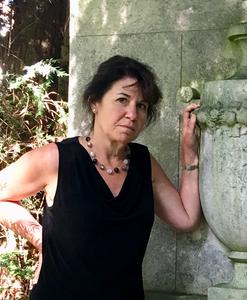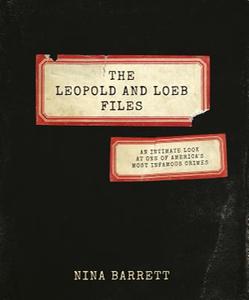
|
|
|
photo: Jeff Garrett |
|
Nina Barrett is the founder and owner of Bookends & Beginnings, an independent bookstore in Evanston, Ill., that opened in 2014. With a background in book publishing and journalism, she has published three books with Simon & Schuster; her newest is The Leopold and Loeb Files: An Intimate Look at One of America's Most Infamous Crimes (Agate Publishing, July 17). She also trained as a professional chef, and her food reporting series Fear of Frying for Chicago's NPR station WBEZ earned her the James Beard Award for Best Radio Show two years running, 2012 and 2013.
On your nightstand now:
I have a Bookseller's Nightstand, which means about 50 ARCs and recent releases stacked up there at any given time, but here's a snapshot of right now:
The Great Believers by Rebecca Makkai. I'm awestruck by this brilliant novel about the impact of the AIDS epidemic on a circle of Chicago friends.
November Road by Lou Berney (coming in October). A total page-turner, with the Kennedy assassination as a backdrop, and I'm deeply impressed that he can write heartless hitmen and little kids with the same ease and believability.
A Bite-Size History of France: Gastronomic Tales of Revolution, War, and Enlightenment by Stephane Henaut and Jeni Mitchell. Clever, delicious history lessons about France and its foods, dished out in perfect bedtime-size portions.
These Truths by Jill Lepore (coming in September). The ARC I was most excited about picking up at BookExpo. Because: Jill Lepore.
The Diary of a Bookseller by Shaun Bythell (coming in September). What could be more fun for a bookseller than a memoir about a year in the life of a Scottish bookstore owner "and of the delightfully unusual staff, eccentric customers, and surreal buying trips that make up his life?"
Favorite book when you were a child:
Harold and the Purple Crayon by Crockett Johnson. Harold teaches us that Life is an adventure you create with your imagination.
Your top five authors:
Homer: I was assigned the Iliad and the Odyssey as summer reading between seventh and eighth grades, and they sparked my enduring obsession with Greek mythology and the history of Bronze Age Greece.
George Eliot: For about a decade after college, I reread Middlemarch once a year. I'm astonished by the breadth and depth of Eliot's understanding of human nature.
Edith Wharton: My favorite novel of hers is The Custom of the Country, in which an unlikable Midwestern girl named Undine Spragg keeps marrying her way up in New York society.
Joanna Trollope: I love how she's able to pull one little straw loose in her characters' lives and then explore how it rearranges everything.
Dr. Seuss: My father loved reading Seuss aloud and I think it helped implant in me the musicality of words, and also a deep appreciation of absurdity.
Book you've faked reading:
Ulysses by James Joyce. Required English major reading, so I couldn't escape it, but I couldn't have cared less about Leopold Bloom's ramblings, even after decryption via Cliffs Notes.
 Book you're an evangelist for:
Book you're an evangelist for:
This question is especially cruel to booksellers, since we are all evangelists for a huge number of books and don't want to be forced to choose some above others. Can I pick my two favorite books of food writing that I try to force on everyone? Don't Try This at Home, an anthology of cooking disaster stories by famous chefs (edited by Kimberly Witherspoon and Andrew Friedman) that helped me laugh my way through the dramas and traumas of culinary school; and The Man Who Ate Everything by Jeffrey Steingarten, whose bighearted curiosity about food was a huge inspiration to me in my Fear of Frying radio stories.
Book you've bought for the cover:
When I was 12 or 13, I bought a copy of Of Human Bondage by W. Somerset Maugham, because the back cover copy said, "She used him... she rejected and despised him... and still he came back for more!" and I thought it would be a fun dirty book, but it was less fun than I had hoped.
Book you hid from your parents:
The point is, I knew where they were hiding their books from me. That's where I found Fear of Flying by Erica Jong, Memoirs of an Ex Prom Queen by Alix Kates Shulman, and several other great 1970s books in which women discovered sex (and so did I).
Book that changed your life:
Alice Miller's The Drama of the Gifted Child. It cracked me open and set me free.
Favorite line from a book:
From Middlemarch: "If we had a keen vision and feeling of all ordinary human life, it would be like hearing the grass grow and the squirrel's heart beat, and we should die of that roar which lies on the other side of silence."
Five books you'll never part with:
Well, the Iliad and the Odyssey, and Middlemarch, as per above. And then, don't try to take away my Joy of Cooking (Rombauer, Becker, and Becker) or The Silver Palate Cookbook (Julee Rosso and Sheila Lukins).
Book you most want to read again for the first time:
A Tree Grows in Brooklyn by Betty Smith. I'd like to be 11 again and see the world exactly as Francie does; but on the other hand, you can reread this book as an adult and even more deeply appreciate how real and complex the adult characters are.
What drew you to the Leopold and Loeb story?
Is it weird that, as the author of a book about a famous murder, I have so little murder & mayhem on my lists? But it was never really the Crime part of the Leopold and Loeb story that got hold of me. What I see there that grabs my heart is a drama about three immigrant families coming to America, having their American Dream of money and social success come true, setting their kids up with the most elite and prestigious educations money can buy--and then having it all unravel in the most horrific way because of some deep Shakespearean flaw in the human soul that remains unfathomable no matter how many times and how many ways this story gets retold.

